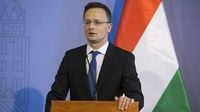On Monday, September 8, 2025, Israel’s Foreign Minister Gideon Sa’ar landed in Budapest, Hungary, for the start of a high-stakes diplomatic tour through Central and Eastern Europe. His arrival coincided with grim news from home: a deadly terrorist attack had just unfolded in Jerusalem’s Ramot Junction, where two Palestinian assailants opened fire on buses, killing six Israelis and injuring many more, including a pregnant woman. The attack, which has since been denounced by Israeli Prime Minister Benjamin Netanyahu, cast a somber shadow over Sa’ar’s visit and set the tone for his urgent message to European leaders.
Speaking alongside Hungarian Foreign Minister Péter Szijjártó at a joint press conference, Sa’ar did not mince words. “Immediately after landing in Budapest I received terrible news. This morning, there was a horrific terror attack in our capital Jerusalem. Two Palestinian terrorists murdered Jews on buses at the Ramot Junction at the entrance to Jerusalem. So far, six Israelis have been killed. There are many, many injured, including a pregnant woman; we pray for them,” he said, according to the Jerusalem Post and other outlets covering the event.
Sa’ar’s remarks quickly moved from the personal to the geopolitical. He framed the attack as part of a broader conflict, declaring, “We are in a war against radical Islamist terrorism. Europe and the international community—every country—must now make a clear choice: Are they on Israel’s side? Or are they on the side of the jihadists? We know Hungary is on our side.” This stark dichotomy was not merely rhetorical. Sa’ar specifically pointed to Hungary’s actions in recent years as evidence of steadfast support for Israel, especially in contrast to shifting positions elsewhere in Europe.
Hungary’s alliance with Israel has deepened since the election of Prime Minister Viktor Orbán’s second government in 2010. As reported by Hungary Today and corroborated by JNS, Budapest has consistently opposed United Nations resolutions sanctioning Israel for its military actions, often standing alone among European Union and NATO members. In April 2025, when Israeli Prime Minister Benjamin Netanyahu visited Hungary, the country refused to honor an International Criminal Court (ICC) arrest warrant issued against him. Orbán, questioning the legitimacy of the ICC, labeled it a “politically motivated” institution. This skepticism culminated in Hungary’s formal withdrawal from the ICC on May 20, 2025—a move that drew both praise and criticism from across Europe.
During Monday’s press conference, Sa’ar used the Jerusalem attack to underscore his government’s rejection of international pressure to establish a Palestinian state. “We completely reject the current attempts to force Israel to accept a Palestinian terror state in the heart of our tiny land. The terrorists this morning came from P.A. territories. The establishment of such a terror state would have one goal—the elimination of the State of Israel,” he asserted. Sa’ar further accused the Palestinian Authority of actively supporting terrorism through its so-called “pay for slay” policy, which rewards the families of those who commit attacks against Israelis. “It must be made clear: The Palestinian Authority has never disconnected from its support for terror. It rewards and encourages terror with its ‘pay for slay’ policy for terrorists and their families. The more severe the crime—the more they pay. It continues its incitement against Israel and Jews—in schools, textbooks, mosques and media. Based on its actions—the P.A. does not deserve a state,” Sa’ar said, according to JNS.
Hungarian Foreign Minister Szijjártó echoed Sa’ar’s tough stance, using the occasion to call for the immediate release of all hostages held by Hamas in Gaza, including a Hungarian citizen. “Middle East security is directly linked to Central Europe’s. Hungary backs international efforts to eliminate terror & restore peace. Hamas must release all hostages immediately, including the Hungarian citizen still held captive,” Szijjártó posted on X (formerly Twitter), as quoted by the Jerusalem Post.
The contrast between Hungary’s position and those of other European nations was also a recurring theme. In the wake of the October 7, 2024, Hamas attack on Israel—a pogrom that shocked the world—leaders in France and the United Kingdom recently announced their intention to recognize a Palestinian state. Israeli officials, including Sa’ar, view such moves as misguided and potentially dangerous, arguing that they reward Hamas and undermine Israel’s security. According to Hungary Today, “While many countries in Western Europe, led by the liberal Left, are moving towards recognizing the Palestinian state and backstabbing Israel, Hungary remained one of the few standing up for Jerusalem.”
Sa’ar’s itinerary in the region extended beyond Hungary. On Tuesday, September 9, he was scheduled to meet with Croatian Prime Minister Andrej Plenković, Foreign Minister Gordan Grlić Radman, and Speaker of the Parliament Gordan Jandroković in Zagreb. His visit included a meeting with Croatia’s Jewish community and a solemn trip to the memorial for Holocaust victims of the Ustaše regime—a fascist government allied with Nazi Germany during World War II. The Ustaše ran 20 concentration camps, including the infamous Jasenovac complex, where 30,000 Jews were murdered, as reported by JNS. Sa’ar’s tour was also set to include meetings with Montenegro’s President Jakov Milatović and Romania’s Foreign Minister Luminița Odobescu, reflecting a broader Israeli effort to shore up support among Central and Eastern European nations.
Throughout his visit, Sa’ar’s message was clear: Israel is facing existential threats and needs reliable allies. He praised Hungary for its “unequivocal” support, contrasting it sharply with what he characterized as wavering or even hostile policies from other Western nations. The Israeli foreign minister’s comments were met with approval from conservative leaders across Europe, many of whom lauded Orbán’s willingness to defy Brussels and resist pressure from international bodies like the ICC.
Yet, the path forward is fraught with challenges. Hungary’s withdrawal from the ICC and its close alignment with Israel have drawn criticism from human rights advocates and some European politicians, who argue that such moves undermine international law and accountability. Meanwhile, the debate over recognition of a Palestinian state continues to divide Europe, with Hungary and a handful of other countries standing firmly on one side of the fault line.
As Sa’ar moves on to the next stops in his diplomatic tour, the stakes remain high—not just for Israel and its immediate neighbors, but for the broader international community grappling with the complex realities of Middle East peace and security. For now, Hungary’s government has made its position unmistakably clear, offering Israel a rare and public show of solidarity at a time of deep division elsewhere on the continent.
In a region where alliances are shifting and old certainties are being tested, the events of this week in Budapest and beyond have given the world a fresh look at how the battle lines—political, diplomatic, and moral—are being drawn anew.




